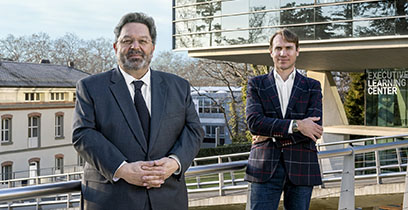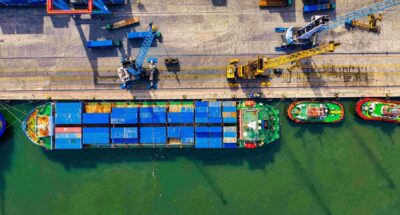
India is ready to play key role in an emerging new world order
Mridul Kumar, India’s ambassador to Switzerland, gives his personal view of his nation’s growing role as a leader in a multipolar world....
Audio available
June 26, 2024 • by Arturo Bris in Competitiveness
Don’t be deterred by doom-laden narratives. To create societies that are prosperous and inclusive, it’s time for leaders to focus on facts and future readiness, says Arturo Bris...
What is the greatest risk in the world today? The answer, according to the World Economic Forum’s Global Risks Report 2024, is misinformation. This survey of world leaders considers it to be a higher risk than extreme weather events, societal polarization, cyber insecurity, and even interstate armed conflict.
But why are we misinformed? I find this subject fascinating, but I would say it’s not misinformation as much as disinformation. One reason, I believe, is that executives hardly ever say “I don’t know.” They’re expected to have an opinion on absolutely everything, so end up perpetuating facts and statements that may not be true.
Very often, these statements are politically motivated or rooted in ideology. For example: “Artificial intelligence is going to be very good for economies and it will create jobs.” Is it? Will it? On AI, business leaders say, “It’s going to be great, but not for me,” while most organizations are playing wait and see. So, time will tell.
“As an economist, I don’t make predictions. But I do like to read data, and what I see is a herd mentality driven by (mostly English-speaking) opinion-makers who call you 'crazy' for saying something that deviates from the norm.”
Every time we publish the World Competitiveness Ranking, complaints inevitably follow. Typically, someone disagrees with our data. If the data shows that the inhabitants of a certain country hate their government, then officials will say, “You’re not asking the right executives. Your data is wrong.” Our data is not wrong.
As an economist, I don’t make predictions. But I do like to read data, and what I see is a herd mentality driven by (mostly English-speaking) opinion-makers who call you “crazy” for saying something that deviates from the norm. Let’s look at some examples of conventional wisdom. For English-language news outlets, China is both a risk and an opportunity, Europe is populated by a bunch of lazy guys who don’t work and take long vacations, and Africa is promising but too risky.
But think about who the opinion-makers are. If you look at who goes to Davos, for example, the overwhelming majority of attendees are American. This is almost three times as many of the next biggest contingent – the British – which in turn is followed by the Swiss, German, Indian, and French. Is what comes out of Davos, then, truly the global view? There is a massive lack of representation. The reality we are building conforms with a particular set of opinions.
Here’s another piece of received wisdom. McKinsey estimates that AI could add around 16%, or $13tn, to global output by 2030. That is equivalent to the GDP of the whole of the EU, or China. A technology that is going to create a new China in the world economy by 2030? We need to be AI-ready, we’re told. Do we? Then they tell us our estimates are calculated with a simulation. A simulation? Interesting!
Many African countries are not heavily indebted, so they can invest heavily if they have the right institutions.
Africa is becoming one of the world’s most promising regions. When you look at the percentage of government debt in proportion to GDP last year, the countries with the most debt were Japan (260%), Singapore (170%), the US (120%), France (110%), Spain (110%) and the UK (just over 100%). Only after that do you see the African countries, together with China. Switzerland comes in at 47%, but even that is more than Nigeria (46%). Many African countries are not heavily indebted, so they can invest heavily if they have the right institutions.
Again, on Refinitiv’s latest Economic Risk Index Scale, the lowest-risk countries include Togo, Namibia, and Zambia, and with six African countries on a par with the UK in terms of risk, Africa is set to be one of the most competitive regions.
South Korea and China, meanwhile, are showing a gradual steady increase. The total number of patent applications has been consistently twice as high in Asia than in North America.
We Europeans are often told that we’re doomed. All we do is put constraints on innovation – and in the meantime, the US and China are speeding up. The data shows us that this is not true.
For example, if you look at the number of international patents related to hydrogen, you will see that the number of new patents filed by EU countries and Japan has been increasing, while the number of those filed by the US has shown a downward trend since 2014. South Korea and China, meanwhile, are showing a gradual steady increase. The total number of patent applications has been consistently twice as high in Asia than in North America.
When it comes to funding, Europe dominates. Look at the number of AI-related publications worldwide, as collected by Nikkei Elsevier, in the years 2016-2020, and you’ll see that Europe is in the lead, followed closely by China, with the US lagging far behind. This pessimism about Europe is undeserved; I am extremely optimistic about Europe, just as I am about the Middle East, Southeast Asia, and Africa.
On regulation, the typical line is that the US finds ways to facilitate innovation, vs the EU, which puts blocks in the way. The EU’s AI Act (June 2023) has, among its specific objectives, a pledge to “ensure legal certainty to facilitate investment and innovation in AI” whereas the Executive Order on the Safe, Secure, and Trustworthy Development and Use of Artificial Intelligence (October 2023) aims to “develop principles and best practices to mitigate the harms and maximize the benefits of AI for workers by addressing job displacement, labor standards… providing guidance to prevent employers from undercompensating workers.” This will likely hinder innovation.
The emerging market miracle will continue and spread but be based on services rather than industry and commodities.
Productivity has risen much faster in the US than in Europe over the past 20 years, but if you plot the IMD World Competitiveness Ranking 2024 against the labor output per person employed, you see a different picture. Luxembourg is more productive than the US but less competitive; competitiveness is not the same thing as productivity. Competitiveness is how you translate productivity into prosperity and a good standard of living.
One measure of competitiveness is life expectancy at birth. A second indicator is how fairly income is distributed. In the World Bank’s Gini index, which reflects this, the UK, Canada, and France fare better than both China and the US. Another measure of competitiveness is access to capital. If you have access to money, you can invest, and your money can grow. This is something the US does do very well.
It’s also worth noting that acquisitions make it harder to see where innovation is. Take Nvidia, which grew massively through huge acquisitions, mostly from abroad, between 2005 and 2013, when the California-based tech company acquired companies in the UK, Germany, Switzerland, Sweden, Israel, and others. Or take Google: many of its innovations are from its acquisition of DeepMind, a UK company.
IMD founded the concept that competitiveness should be an objective of government policy. Not just growing the economy (or increasing trade) but growing the economy fairly and competitively.
In this year’s ranking, the top 10 countries are Singapore, Switzerland, Denmark, Ireland, Hong Kong, Sweden, the UAE, Taiwan, the Netherlands, and Norway. What they have in common is good institutions, low debt, access to public health, and of course a productive economy. It is interesting to see which countries have taken this concept of competitiveness into account and are striving to improve. Saudi Arabia, for example, has gone up 23 places in this year’s ranking.
As I’ve said, I do not make predictions. But I can confidently state that to thrive, countries must have the following:


As business leaders, do not hope for a better future. It is your responsibility to shape it. Create the world you want your children to live in. Social impact is not just about planting trees. Create jobs and pay high salaries. Pay taxes and contribute to your country’s economy. Develop talent in your organization. Run for public office. Preserve fairness and inclusion. And avoid conventional wisdom. No country is doomed to fail.
The future belongs to leaders who build prosperity and a better quality of life. Leaders like these three:

Tamkivi, an early executive at Skype in Estonia, is a member of the Founders Association and was its President for 2020-21. The Association reinvests money into Estonian startups. He is committed to building his country, which has now closed the gap with other European countries.

Our EMBAs are mesmerized by Villig’s vision. Bolt is competing with Uber. Uber asked to buy Bolt. Bolt said, “No. I don’t want you to buy me, I want to kill you.” And it is succeeding.

Tang started as an entrepreneur in Silicon Valley, moved to Taiwan and her vision was so forward-looking, she was invited to become a minister.
This article is inspired by a keynote session at IMD’s signature Orchestrating Winning Performance program, which brings together executives from diverse sectors and geographies for a week of intense learning and sharing with IMD faculty and business experts.

Professor of Finance at IMD
Arturo Bris is Douglas Geertz IMEDE 1988 Professor in Geopolitics and Business and Professor of Finance at IMD. Since January 2014, he has led the world-renowned IMD World Competitiveness Center. At IMD, Bris directs the Boards and Risks program and Blockchain and the Future of Finance program. He also previously directed the flagship Advanced Strategic Management program between 2009 and 2013.

July 1, 2025 • by Mridul Kumar in Geopolitics
Mridul Kumar, India’s ambassador to Switzerland, gives his personal view of his nation’s growing role as a leader in a multipolar world....
 Audio available
Audio available
June 26, 2025 • by Ngozi Okonjo-Iweala in Geopolitics
Faced with the threat of trade fragmentation, many are now waking up to the true value of preserving a rules-based system of cooperation – and business can help defend it too, says...

June 26, 2025 • by Michael Yaziji in Geopolitics
Forward-thinking leaders proactively shape their external environment, turn uncertainty into certainty, and create substantial value in the process....
 Audio available
Audio available
June 24, 2025 • by Jerry Davis in Geopolitics
The tech broligarchs have invested heavily in Donald Trump but are not getting the payback they bargained for. Do big business and the markets still shape US government policy, or is the...
 Audio available
Audio available
Professor of Finance at IMD
Arturo Bris is Douglas Geertz IMEDE 1988 Professor in Geopolitics and Business and Professor of Finance at IMD. Since January 2014, he has led the world-renowned IMD World Competitiveness Center. At IMD, Bris directs the Boards and Risks program and Blockchain and the Future of Finance program. He also previously directed the flagship Advanced Strategic Management program between 2009 and 2013.
Explore first person business intelligence from top minds curated for a global executive audience